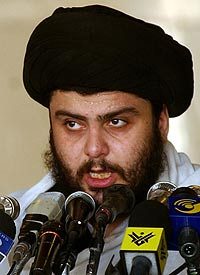Shrine bombing to test political skills of al-Sadr

Al-Sadr political skills and control over his feared Mahdi Army militia will be tested by the second bombing at the Samarra shrine.
Upon his return from several months in Iran
, the radical Shiite cleric has recast his image from firebrand sectarian rabble-rouser to a unifying, moderate national figure. Now he has the chance to prove if he can truly play that role.
Al-Sadr, a political opportunist who enjoys wide following among Iraq's majority Shiites, may have been waiting for just such incident as Wednesday's bombing - an event that likely has further chipped away the credibility of Prime Minister Nouri al-Maliki and could enhance his own credentials.
Toward that goal, he ordered the 30-lawmaker bloc loyal to him to boycott parliament to protest the government's failure to protect the shrine, a move that is likely to weaken a government that's already deeply unpopular for its failure to improve security and services.
Al-Maliki has yet to replace six ministers loyal to al-Sadr who quit the Cabinet in April to protest what al-Sadr said was the government's incompetence and refusal to call for a U.S. troop withdrawal timeline.
"There can be no salvation for Iraq unless we have a government of technocrats," said Qusai Abdul-Wahab, a lawmaker loyal to al-Sadr, suggesting that the Sadrists may be seeking to topple the government, a Shiite-dominated administration that includes Sunni Arabs and Kurds.
The personal political breakthrough al-Sadr seeks can only be partially helped by the collapse, or weakening, of al-Maliki's government. What he needs the most is to convince Iraqis - Shiites, Sunnis and Kurds - that he has what it takes to be a leader for all Iraqis.
The first test is whether he can prevent his Mahdi Army militia from repeating the large scale sectarian attacks against Sunni Arabs that it launched after the first bombing of the Samarra shrine nearly 16 months ago.
That explosion of sectarian violence, which continues today, began within hours of the bombing. This time round, only a handful of Sunni mosques were attacked in the first 24 hours after the bombing.
But it may be too early to judge the reaction of Shiite militants.
A curfew in Baghdad and increased troop levels in likely flashpoints may be masking rage that will break out later when the controls are eased.
A senior Mahdi Army commander in Baghdad, the militia's stronghold, said al-Sadr has ordered his fighters to remain calm and avoid clashing with U.S. forces, which have been vigorously hunting for militia leaders in the four months since a major security push began in Baghdad.
Al-Sadr took a similar stand following last year's bombing, but that didnot deter hismilitiamen from going on a killing rampage. The possibility of a recurrence may be greater this time because large groups of the militia, which is estimated to number up to 60,000 fighters, broke away and now operate independently with the help of Shiite Iran.
But al-Sadr may be a much more seasoned, and ambitious, politician than he was last year.
Aides and loyal lawmakers have said the cleric was honing plans to become the country's foremost leader and that his strategy was based in part on his belief that Washington will soon start pulling out troops or draw them down significantly, leaving behind a huge hole in Iraq's security and political power structure that he and his loyalists could fill.
Since he emerged three weeks ago from what U.S. officials say was voluntary exile in Iran, he has sought to cast himself and his movement as nationalists whose primarily aim is to get U.S.-led foreign forces to leave Iraq, a goal that places him in common territory with Sunni Arabs and the vast majority of Shiites.
Al-Sadr, whose militiamen fought U.S. forces in 2004, adopted a conciliatory tone Wednesday, urging his followers in a statement not to blame Sunnis for the latest bombing and, in keeping with his customary anti-U.S. rhetoric, said the United States and Israel were behind it.
In a television interview last week, he sought to distance himself from Shiite Iran, a country loathed by Sunni Arabs and many Shiites for its perceived anti-Arab sentiments, saying he rejected any interference by Tehran in Iraq's internal affairs.
He also has been reaching out to Iraq's small Christian community, calling for their protection and sending aides to visit churches in Baghdad in a show of solidarity following attacks on Christian places of worship and clerics.
He came out strongly in support of Iraq's large Kurdish minority following last week's shelling by Turkey of suspected separatist bases in Iraq's Kurdish north, chastising Ankara and threatening that Iraqis would not remain silent in the face of its "transgressions".
Al-Sadr's anti-Americanism is the main plank of his street politics and could well be the ticket to an unassailable position atop Iraq's political heap.
He has won generous praise when parliament, acting on a proposal by Sadrist lawmakers, passed a resolution June 5 requiring the government to seek the house's permission for asking the United Nations to extend the mandate of U.S.-led forces in Iraq.
On Thursday, thousands of his supporters defied the curfew and marched in Baghdad's Shiite Sadr City district to call for the withdrawal of U.S. forces from Iraq. Smaller demonstrations by al-Sadr followers also took place in several Shiite cities south of Baghdad.
Subscribe to Pravda.Ru Telegram channel, Facebook, RSS!


